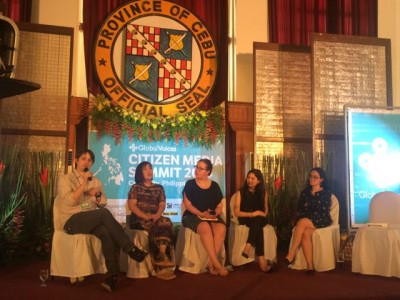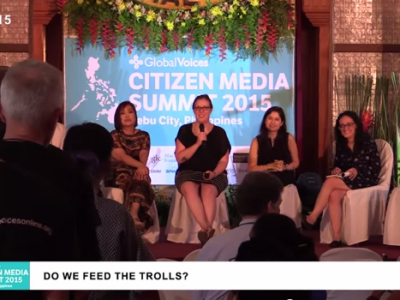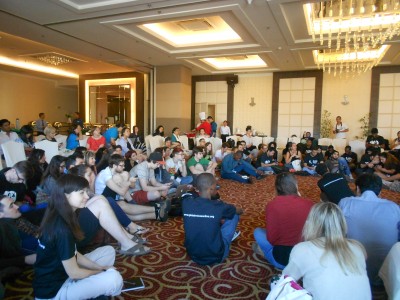
Kevin Rothrock offers advice on the fine art of troll-feeding. He is joined by (L-R) Noemi Lardizabal-Dado, Jillian C. York, Arzu Geybullayeva and Lina Attalah. Image by author.
Originally published on Ethan Z's blog.
Five days with Global Voices leaves me feeling pretty good about the state of the world, and the shape of the internet. But the ‘net is not always a friendly place. Our post-lunch session on the closing day of our conference is “Do We Feed the Trolls?”, hosted by the estimable Jillian York, of Global Voices and the Electronic Frontier Foundation.
Noemi Lardizabal-Dado, a celebrated Filipina momblogger. In 2006, she started blogging as a mother who had lost a child. In 2009, she founded blogwatch.ph, a leading Filipino citizen media site. She’s now an empty nester after years as a fulltime homemaker. Her motivation for writing online is making a difference in her children’s lives, but by making the world a better place.
She tells us, “I don’t feed the trolls – the trolls feed me.” Years ago, she interviewed a Filipina who accused her UK boyfriend for fraud – she continues to be harassed online by him. She called out a showbiz celebrity on child abuse and remains engaged with his supporters online. Now, in writing about the cutting of pine trees in front of a big shopping mall, she’s facing a new wave of trolling.
The trolls Noemi encounters include people motivated by their own opinions and interests, but also by bots that respond to keywords, trolls hired to do “black operations”, and the bored individual seeking attention. She shows a slide with the names she’s called: slacktivist, brandbasher, mom-blocker.
How do you ignore a troll? Do your own SEO to ensure that you’re more visible than what the trolls are saying – put your name out in the medium where they are attacking you. Use your allies as troll-slayers – let them fight your battles. When people get really awful, she blocks or bans them. She prefers not to engage in arguments, but ultimately, she believes the best goal is to show troll stupidity.
Showing a slide titled “Keep Calm and Call the Cyber Police”, she tells us about a story when she began getting death threats for accusing a politician of child abuse. The Philippines have a law against death threats, so she felt empowered to bring law enforcement into the equation.
“Trolls feed me,” she says. Often they give me ideas for stories to cover. And they give me more twitter followers (Check her out at @momblogger.) If you’re being trolled, perhaps this is an added benefit. She suggests that you should also listen to the trolls – you don’t want to be caught in your own filter bubble, your own private internet. Sometimes trolling is intelligent commentary wrapped in bombast.
Arzu Geybullayeva notes that her trolls have a different agenda. They accuse her of being a secret agent, of being a traitor, or they simply sexually harass her.
She does, in fact, speak several languages, and she notes that it’s odd to think that there are people in the world who actually believe she is an agent for Armenia, Azerbaijan’s historical enemy. She is highly critical of Azerbaijan, which leads people to see her as a secret Armenian. Since she also writes for an Armenian newspaper in Turkey, that’s further fuel for their beliefs. Others see her as an agent for secret Western powers.
In truth, Arzu focuses on building peace and understanding in the Caucuses. But this work has now made her a major figure for troll attacks online. She wishes she felt as warmly about her trolls as Noemi does, but the attacks have often been quite personal and scary.
Lina Attalah, who writes for a number of Egyptian publications, notes that trolling is often similar across different cultures – she, too, finds herself often accused of being a secret agent. In Egypt, she notes that politics has been reduced to a simple binary: the military or the Muslim Brotherhood. If you choose a third, independent path, you become a magnet for trolling.
Her newspaper covered the massacre of a Muslim Brotherhood campsite by the police. They were one of very few papers to cover the atrocity. She is very clear that she and her paper are not pro-Brotherhood, but they felt this grave abuse of rights was critical. Once they documented the massacre, the trolls came out in force.
“There is very little logic when it comes to trollers’ responses.” The same people called them Hamas supporters and Israeli spies. Trolling isn’t just an online phenomenon, she says – it is fed by the political context in which it grows.
“I don’t like responding because I don’t have energy for it,” Attalah says. Furthermore, you don’t ever want to defend your nuanced position in the face of this simplistic binary. Not being responsive to trolls is critical to maintaining their independence as a media outlet.
Kevin Rothrock, co-editor of Global Voices’ RuNet Echo, is introduced as one of our most frequent troll targets. Rothrock notes that as a man, he’s not subject to the weird sexual aggression women experience online. As someone reporting on Russia from the US, he’s not directly at risk as he would be on the ground. “I can talk about trolling as a business or an art, because I’m very far outside it.” He notes that some people at Global Voices are writing out of expertise or interest, not knowledge on the ground – when they get trolled, it’s a different, more distant, experience.
When reporting on Russia, Kevin says, I get it on both sides. RuNet Echo is funded by Open Society Foundation, Kevin is based in Washington, DC, and these facts lead trolls to believe he’s a State Department propagandist. But his reporting also tears apart many of the cherished myths of the Russian opposition. When you draw attention to this tensions, the Russian left often criticizes him as a traitor to their work.
“Do I feed the trolls? I interview them!” RuNet Echo has interviewed pro-Kremlin trolls. He worries that this may be making them stronger, but they’re a key piece of the Russian online ecosystem. When you’re writing from afar, though, trolling can be intellectually stimulating and interesting – Kevin says he gets his best troll responses when he’s waiting in line in the supermarket. It’s a form of mental exercise.
York notes that Kevin’s very first statement was about gender. Jill notes that while she usually works at a distance, she often does feel threatened by people locally who respond to her online. She asks the panel whether this sense of threat is more about gender or locality.
Arzu believes that trolling is a response to outspokenness. Threatening you with rape and sexual violence is a way of using the intimidating power of a patriarchal society. Women in Azerbaijan often do feel intimidated by male power and violence. Issues like reconcilliation, which she works on, seem to particularly trigger the trolls. But her commitment to the work keeps her going in the face of these threats.
“Being a women gives trolls more ideas”, explains Attalah. Her male colleagues get similarly attacked, but the attacks on them are not sexual and are less personal. Arzu notes that the attacks that are most disturbing don’t target her, but her mother.
Noting that Global Voices contributors are frequently targeted by government trolls, she asks the panel whether they feel targeted by governments. For Noemi, the similarity of language used by some of her trolls suggests a coordinated, anti-left campaign that is likely to have government support. Rothrock notes that the Russian government certainly sponsors and pays pro-Kremlin trolls – there’s well established research on troll factories and troll farms. These are likely owners of small PR firms who ideologically support Putin. These people interest Rothrock, because he appreciates the authenticity of their views, even if he worries that their attacks are damaging the online space for civil society. Attalah notes that researchers are investigating “electronic armies” of trollers as a different group from individual users.
York notes that when she wrote a story about Azerbaijan she got a wave of responses telling her how wonderful and beautiful the country was. Arzu notes that Azerbaijan is a country that’s happy to construct a Potemkin reality, including hosting its own version of an international Olympics. It’s not a surprise that the government would mobilize an army to respond to online criticism.
Trolling implies little, unempowered individuals complaining, but York worries most about trolling that “punches down”, with powerful individuals threatening weaker actors. Arzu notes that trolling really began to scare her when a noted television presenter, who knows her father personally, began denouncing her on air.
York holds a straw poll, asking the audience whether or not we should feed the trolls. A significant group supports feeding the trolls, a minority believes we never should, and many are undecided. Attalah, Arzu and Noemi note that they’ve got too much to do as writers and activists to feed the trolls.
As for Rothrock: “Feed them ’til they choke on it.”
Jeremy Clarke wonders if anyone has ever converted a troll, changing their view? Rothrock notes that by engaging with trolls, he’s sometimes able to get involved with more civil, productive discussions. Some of these trolls are quite smart, and he appreciates what he’s learned from them. York notes that the opposite has happened to her – she’s had an acquaintance turn into a troll.
A questioner notes that she writes online about sexuality, and routinely is attacked with sexual language directed at her and at her mother. She simply retweets these attacks and lets her reporters respond. One troll was so persistent, he attacked everything she wrote. As an experiment, she simply tweeted a visit to Starbucks – he attacked that as well. Finally, so frustrated, she asked the troll if he had the balls to meet her in person. She set a date and a time, and showed up at a café her friends own – the troll never showed up, and also stopped attacking her.
Gershom Ndhlovu, a Global Voices volunteer from Zambia, tells us that the new Zambian government bought 600 computers and gave them out to party cadres, and paid for data plans for those supporters. If you wrote anything about the government on Facebook, these guys would attack you in response. Troll armies are real and can be powerful.
Kevin Rennie from Australia notes that trolls try to dominate hashtag conversations. He wonders how this can be combatted. Rothrock notes that it’s easy to flood a hashtag. Instead, you need to rely on more closed conversations, which rely on individual thought leaders. He does note that it’s dangerous to assume that anyone who’s angry or disruptive online is part of an organized movement. It’s dangerous to dismiss genuine constituencies that disagree with your point of view. In Russia, Putin has enormous support. When people destroy a hashtag, it’s not always a bot army – it may be legitimate dissent.
Thant Sin from Myanmar notes that the internet in his country is utterly filled with religious and racist hate speech. Posts can be followed with hundreds of comments with hate speech. The experience is one of an ongoing battle on the comments on Facebook. He explains that we believe that these commenters are being encouraged by the government, but that this is unproven. His personal response is to ignore these angry threads.
A questioner addresses his question to “the male CIA agent”, and asks how he would respond to trolls speaking to him in the real world. Rothrock notes that he’d be a very different person online if he were engaged from Russia rather than from the US. He suspects he would be far more careful and would watch what he says, which would mean he’d have a very different online experience.
Filip Stojanovski references a case in Macedonia where a government news portal is run by anonymous people. It’s a trolling infrastructure supported by two hundred thousand Euros in government advertising. One popular tactic is identifying people in photos of protests, which Amira Al-Hussaini notes is popular in Bahrain. He wonders if it would be ethical for us to develop an index of trolls, at least of government trolls? Rothrock notes that he and his RuNet Echo co-editor are in a database as “pathological Rusaphobes”. York notes that some trolls have been immortalized in the Encyclopedia Dramatica. Noemi notes that she doesn’t want to give any more visibility to these trolls and wouldn’t want to immortalize them this way – they would probably enjoy them. Arzu maintains her own personal folder.
Janice from Bulaplap.com, a progressive media outlet in the Philippines, notes that her outlet is “red tagged”, accused of being associated with terrorist groups in the Philippines. “Bulaplap” is a term meaning “unearth”, but also has sexual connotations. The Arroyo government created a mirror site of Bulaplap that contained pornographic images, suggesting that the media site was really about pornography. She wonders whether those of us who control our own blogs should censor trolling comments.
Attalah tells us that the commenting policy on her newspaper has been not to censor anything. At this point, though, they are reconsidering in the case of hate speech and threats of sexual violence. Arzu closes with the observation: “Trolls are trolls. Don’t let them stop the work we’re doing.”












1 comment